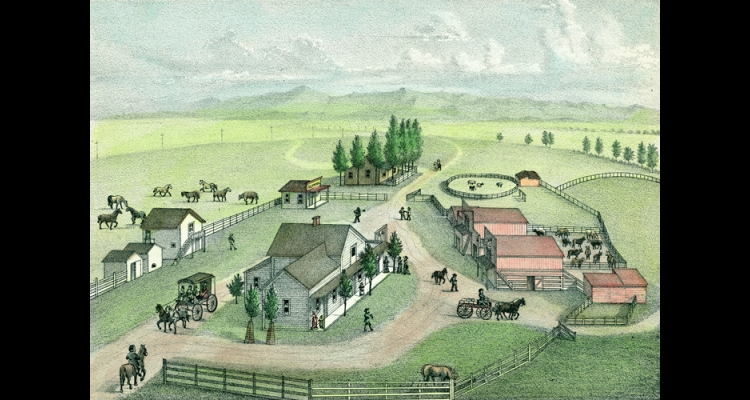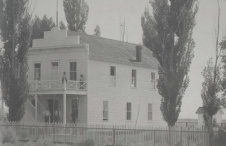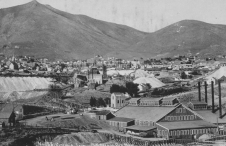Ragtown/Leeteville
Along U.S. Highway 50 west of Fallon, a historical marker designates the site of old Ragtown/Leeteville. Although neither survives today, they were of paramount importance to early-day Nevada travelers. At the end of America's westward push, Ragtown was little more than a seasonal tent city, born each spring and torn down each fall by enterprising men hoping to profit from the transcontinental wagon-train trade. California-bound emigrants, weary from their crossing of the dreaded Forty-Mile Desert, found their first water, grass, shade, and rest along the banks of the Carson River. Local lore says the townsite was named for the ragged clothing of those pioneers, washed in the river and hung to dry on every bush and tree around.
In 1855, travelers Jules Remey and Julius Brenchley reported the station consisted of "three huts, formed of poles covered with rotten canvas full of holes." It soon changed. Asa Kenyon, pioneer Churchill County settler, purchased the property the year before the Remey-Brenchley journal account. He farmed along the rich bottomlands of the Carson River and built the first permanent, wooden-framed structure that became his general store.
Kenyon and his family owned and operated the station along the Overland Road for many years. Ragtown remained an overland station after the Simpson route was surveyed and adopted in 1860. Dan DeQuille reported in his 1861 Washoe Rambles, "we were now heading for the ancient and well-known city of Ragtown. The whole town is owned by Mr. Asa Kenyon."
At one time there was a cemetery at Ragtown that held 200 graves. Hazards of the trail took many lives: cholera, fever, and exhaustion were among the most prominent ailments. The graves were marked by log chains, wagon tires, or whatever was at hand. All was lost in the flood of 1861–62 that obliterated everything in the area.
The Ragtown post office was established on May 14, 1864, and was active until May 29, 1867. It flourished again between 1884 and 1887. Kenyon served as postmaster.
An Order of Sale of Real Estate filed in Churchill County in July 1891 transferred the property at Ragtown from Catherine Kenyon, widow of Asa, to James Leete, who had come to Churchill County about 1882. With the change of ownership the property came to be known as Leeteville.
The Leetes ranched as well as operated the old stage station and trading post for many years. It was the only stopping place between the county seat, Stillwater, and the communities of Wadsworth or Virginia City, depending on the road westward. The Leeteville post office was established January 28, 1895, with Esther M. Leete serving as postmistress. Although the post office passed into antiquity on June 15, 1907, the district is still known by the name of Leeteville. The interchange of Highway 50 to Fernley and Highway 50A to Silver Springs and Carson City carries the name Leeteville Junction.



